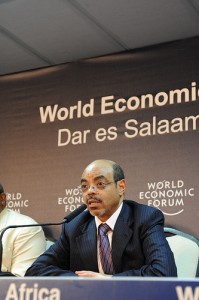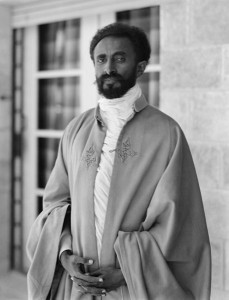Prior to official confirmation of the death of Ethiopian Prime Minister Meles Zenawi on August 21, 2012 [1], the Ethiopian government spokesman, Bereket Simon, had indicated that the Prime Minister would address the public on September 1, the Ethiopian new year.
In an interview [2] with the Australian Special Broadcasting Service [3], journalists asked if he was carrying out his task properly and whether he was providing the public with inadequate information. He answered:
We simply state the fact, those who trust us did trust us. But, there those who don’t trust us – especially among the diaspora, residing in North America and Europe, who are ill-wishers. We know they do not trust us and we didn’t bother to convince them.

Meles Zenawi at the World Economic Forum in Dar es Salaam, Tanzania, May 2010. Photo courtesy of World Economic Forum (CC BY-SA 2.0)
For more than fifty days the Ethiopian public waited without official information about the Prime Minister's whereabouts. The next thing they heard from official sources was that he had died from an undisclosed disease in an undisclosed hospital and in an undisclosed country.
This was not the first time that Ethiopian officials had hidden important information from the public. Are Ethiopians the most secretive people in the world?
The Polish journalist Rysard Kapuscinski [4] once declared “Ethiopians are the most secretive people on Earth”, as highlighted [5] by journalist and blogger Graham Peebles:
Ethiopians are notoriously secretive and distrustful, the great Polish journalist Rysard Kapuscinski in his classic work ‘The Emperor’, regarding the reign of the last Ethiopian Emperor, Haile Selasie and his inner circle, states “the Ethiopians are deeply distrustful and found it hard to believe in the sincerity of my intentions,” elsewhere he goes further claiming that Ethiopians are the most “secretive people on Earth.” Having lived in Addis Ababa and worked with Ethiopians for a number of years, my experience certainly bears out Kapuscinski’s comments reinforced by René Lefort, author of ‘Ethiopia. An heretical revolution?’ when he states “given the history of Ethiopia, where secrecy is a cardinal virtue”.
 [6]
[6]Emperor Haile Selassie I tried to hide the 1973-74 famine. Public domain photo from the G. Eric and Edith Matson Photograph Collection at the Library of Congress.
Emperor Haile Selasie even tried to hide the 1973 famine, continued [7] Peebles:
Image and social status is of great importance within Ethiopian society. In 1973, whilst hundreds of thousands starved, Halie Selasie and his government denied that a famine was taking place in the northeast of Ethiopia, known as the ‘Unknown Famine’ and lied to ITV journalist David Dimbleby, who reported the situation in Wollo that Sellasie and his cronies had attempted to cover up.
An even earlier example of Ethopia's need for secrecy dates from the early 1900's when Emperor Menelik II's [8] death was hidden from the public for years. When he died in December 1913, there was no public announcement [5] officially confirming his death and burial:
Another example of the secretive/duplicitous tendency of the Ethiopian people, creating a false or misleading image was the way Emperor Menelik II death in December 1913 was kept quiet. He died and was buried without any public announcements after suffering a stroke and being unable to govern for several years. And this for and of a man regarded by many as the last true Emperor.
Twitter user Tamara, tweeting as @GovezMedia recalled [9]:
@GovezMedia: #WhereisMeles has me recall being told by a proffessor [sic] in Addis that the death of Menelik was hidden for years #africanleaders
As well as the Prime Minister, another prominent Ethiopian figurehead also died recently. Abune Paulos, the head of the Ethiopian Orthodox church [10]died on 16 August, 2012. However, his death was announced immediately, although the public still does not know the cause and who is going to replace him.
This post was sub-edited by Jane Ellis [11].